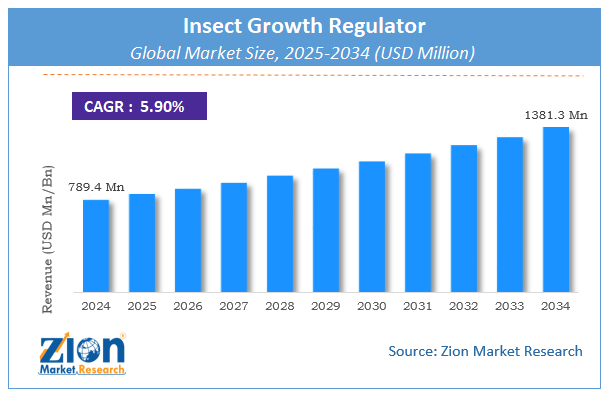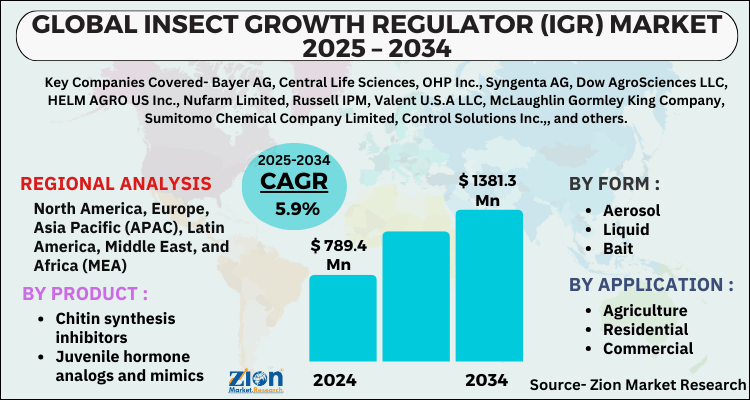Insect Growth Regulator (IGR) Market - Global Industry Analysis 2034

Insect Growth Regulator (IGR) Market By Product (Chitin synthesis inhibitors, Juvenile hormone analogs, and mimics, Ecdysone Antagonists, and Ecdysone Agonists). By Form (Aerosol, Liquid, and Bait). By Application (Agriculture, Residential, and Commercial). and By Region: Global and Regional Industry Overview, Market Intelligence, Comprehensive Analysis, Historical Data, and Forecasts 2025 - 2034
| Market Size in 2024 | Market Forecast in 2034 | CAGR (in %) | Base Year |
|---|---|---|---|
| USD 789.4 Million | USD 1381.3 Million | 5.9% | 2024 |
Insect Growth Regulator (IGR) Market: Industry Perspective
The Insect Growth Regulator (IGR) Market was worth around USD 789.4 Million in 2024 and is estimated to grow to about USD 1381.3 Million by 2034, with a compound annual growth rate (CAGR) of approximately 5.9% between 2025 and 2034. The report analyzes the Insect Growth Regulator (IGR) Market drivers, restraints/challenges, and the effect they have on the demands during the projection period. In addition, the report explores emerging opportunities in the Insect Growth Regulator (IGR) Market
Insect Growth Regulator (IGR) Market: Overview
IGRs are man-made compounds that disrupt the insect's reproductive cycle and eventually kill it. They imitate the hormones found within the insect's body and hinder its growth during the molting stage. The rising global usage of environmentally-friendly pesticides is predicted to be a major driver of market expansion. IGRs are materials that have a high degree of efficiency. As a result, demand from a variety of industries, including agriculture, residential, and commercial, has increased. In recent years, the development in integrated pest control and organic farming methods in rising nations such as India and China has played a significant influence in increasing demand. This pattern is predicted to continue throughout the projected period.
Due to the growing popularity of organic farming, IGRs are in high demand. Crop protection compounds used in organic farming break down quickly and have a little environmental impact because they are primarily derived from natural sources. Thus driving the growth of the market. Furthermore, growing worries about environmental toxicity and human safety drive the need for biodegradable insect growth regulators. Other factors likely to boost the growth of the worldwide Insect Growth Regulators Market include increased awareness of the adverse effects of insecticides on the environment and increased acceptance of ecologically safe crop protection products.
Key Insights
- As per the analysis shared by our research analyst, the global insect growth regulator (IGR) market is estimated to grow annually at a CAGR of around 5.9% over the forecast period (2025-2034).
- Regarding revenue, the global insect growth regulator (IGR) market size was valued at around USD 789.4 Million in 2024 and is projected to reach USD 1381.3 Million by 2034.
- The insect growth regulator (IGR) market is projected to grow at a significant rate due to demand for eco-friendly pest control in agriculture and public health.
- Based on Product, the Chitin synthesis inhibitors segment is expected to lead the global market.
- On the basis of Form, the Aerosol segment is growing at a high rate and will continue to dominate the global market.
- Based on the Application, the Agriculture segment is projected to swipe the largest market share.
- Based on region, North America & Asia-Pacific is predicted to dominate the global market during the forecast period.
Insect Growth Regulator (IGR) Market: Driver
In recent years, there has been an increasing desire for safer insecticides and pesticide products to lessen the adverse impacts of regularly used pesticide products. These insecticides or pesticides are hazardous to both human health and the environment. This is a significant component of the rising need for insect growth regulators in emerging economies. Insect growth regulators are widely employed in the agriculture industry and commercial pest management systems to suppress the normal growth of pests and insects at many stages, including embryonic and post-embryonic development, behavior, and reproduction. The rising demand for environmentally friendly crop protection products is driving the growth of the insect growth regulator market. Various continuous research and development activities in developing a new variety of safe and environmentally acceptable solutions aid in the exponential expansion of the insect growth regulator market.
Insect Growth Regulator (IGR) Market: Restraint
The main limitations are that insect growth regulator chemicals are only effective in the early phases of pest and insect growth and are less efficient when used as a stand-alone control technique. When used as a stand-alone treatment, they have a modest knockdown effect since they only affect the growth stages of insects and pests rather than killing them directly. In addition, a lack of understanding of insect growth regulators, as well as the present use of traditional pesticides, may serve as limitations on the growth of the insect growth regulators market over the aforementioned period.
Insect Growth Regulator (IGR) Market: Report Scope
| Report Attributes | Report Details |
|---|---|
| Report Name | Insect Growth Regulator (IGR) Market |
| Market Size in 2024 | USD 789.4 Million |
| Market Forecast in 2034 | USD 1381.3 Million |
| Growth Rate | CAGR of 5.9% |
| Number of Pages | 180 |
| Key Companies Covered | Bayer AG, Central Life Sciences, OHP Inc., Syngenta AG, Dow AgroSciences LLC, HELM AGRO US Inc., Nufarm Limited, Russell IPM, Valent U.S.A LLC, McLaughlin Gormley King Company, Sumitomo Chemical Company Limited, Control Solutions Inc.,, and others. |
| Segments Covered | By Product, By Form, By Application, and By Region |
| Regions Covered | North America, Europe, Asia Pacific (APAC), Latin America, The Middle East and Africa (MEA) |
| Base Year | 2024 |
| Historical Year | 2020 to 2023 |
| Forecast Year | 2025 - 2034 |
| Customization Scope | Avail customized purchase options to meet your exact research needs. Request For Customization |
Insect Growth Regulator (IGR) Market: Segmentation
The Insect Growth Regulator (IGR) Market is segregated based on Product, Form, and Application.
By Product, the market is classified into Chitin synthesis inhibitors, Juvenile hormone analogs and mimics, Ecdysone Antagonists, and Ecdysone Agonists. In the forecast period, the chitin synthesis inhibitors category accounted for the highest percentage of all insect growth regulators. This sector is dominated by their capacity to limit early growth in insects by inhibiting chitin production, which is crucial for exoskeleton development. Chitin synthesis inhibitors prevent the creation of new chitin by inhibiting the enzyme that catalyzes this reaction, resulting in insect mortality or slowed growth.
By Form, the market is classified into Aerosol, Liquid, and Bait. In the forecast period, the liquid was anticipated to be the largest market. They are in the form of a liquid concentrate and must be diluted before application. In severe infestations, liquid IGRs can also be utilized as a stand-alone product. Despite the fact that these are staining and leave an odor after application. They are widely utilized because of their low cost and great efficacy against severe infestations. Aerosol is expected to grow the fastest during the projected period. Aerosol insect growth regulators are more convenient to utilize than other types such as liquid or bait. They come in compact canister form for simpler applications.
By Application, the market is classified into Agriculture, Residential, and Commercial. Agricultural applications will account for the majority of the market share during the projection period. The elements that can be linked to a paradigm change as a result of increased consumer awareness are boosting demand for this market. Insect growth regulator (IGR) products are widely used in agriculture for crops such as cereals, oilseeds and pulses, fruits and vegetables, and others.
Insect Growth Regulator (IGR) Market: Regional Landscape
North America leads the global market in the forecast period. The demand in North America is mostly driven by health concerns, which have resulted in greater adoption of safer, eco-friendly alternatives to pesticides. Furthermore, new packaging, as well as product developments along with high living standards, are complementing product demand.
Over the predicted period, Asia Pacific is expected to grow the fastest. Rising demand is being driven by increased awareness of professional pest control services, an improving standard of life, an expanding middle-income class population, and increased health awareness. Several research and development efforts carried out in the region would contribute to a growing interest in IGRs among farmers, resulting in increased demand for the worldwide market.
Insect Growth Regulator (IGR) Market: Competitive Analysis
The report provides a company market share analysis to give a broader overview of the key market players. In addition, the report also covers key strategic developments of the market, including acquisitions & mergers, new product launches, agreements, partnerships, collaborations & joint ventures, research & development, and regional expansion of major participants involved in the insect growth regulator (IGR) market on a global and regional basis.
Some of the main competitors dominating the Insect Growth Regulator (IGR) Market include -
- Bayer AG
- Central Life Sciences
- OHP Inc.
- Syngenta AG
- Dow AgroSciences LLC
- HELM AGRO US
- Inc.
- Nufarm Limited
- Russell IPM
- Valent U.S.A LLC
- McLaughlin Gormley King Company
- Sumitomo Chemical Company Limited
- Control Solutions Inc.
The Insect Growth Regulator (IGR) Market is segmented as follows:
By Product
- Chitin synthesis inhibitors
- Juvenile hormone analogs and mimics
- Ecdysone Antagonists
- Ecdysone Agonists
By Form
- Aerosol
- Liquid
- Bait
By Application
- Agriculture
- Residential
- Commercial
By Region
- North America
- The U.S.
- Canada
- Mexico
- Europe
- France
- The UK
- Spain
- Germany
- Italy
- Rest of Europe
- Asia Pacific
- China
- Japan
- India
- Australia
- South Korea
- Rest of Asia Pacific
- The Middle East & Africa
- Saudi Arabia
- UAE
- Egypt
- Kuwait
- South Africa
- Rest of the Middle East & Africa
- Latin America
- Brazil
- Argentina
- Rest of Latin America
Table Of Content
Methodology
FrequentlyAsked Questions
An Insect Growth Regulator (IGR) is a type of pesticide that disrupts the growth, development, or reproduction of insects, rather than killing them outright like conventional insecticides. IGRs are considered a more targeted and environmentally friendly pest control method because they specifically interfere with insect life cycles while minimizing harm to beneficial insects, animals, and humans.
The global insect growth regulator (IGR) market is expected to grow due to increasing demand for sustainable pest control solutions, rising agricultural productivity needs, and growing awareness about integrated pest management.
According to a study, the global insect growth regulator (IGR) market size was worth around USD 789.4 Million in 2024 and is expected to reach USD 1381.3 Million by 2034.
The global insect growth regulator (IGR) market is expected to grow at a CAGR of 5.9% during the forecast period.
North America & Asia-Pacific is expected to dominate the insect growth regulator (IGR) market over the forecast period.
Leading players in the global insect growth regulator (IGR) market include Bayer AG, Central Life Sciences, OHP Inc., Syngenta AG, Dow AgroSciences LLC, HELM AGRO US Inc., Nufarm Limited, Russell IPM, Valent U.S.A LLC, McLaughlin Gormley King Company, Sumitomo Chemical Company Limited, Control Solutions Inc.,, among others.
The report explores crucial aspects of the insect growth regulator (IGR) market, including a detailed discussion of existing growth factors and restraints, while also examining future growth opportunities and challenges that impact the market.
RelatedNews
HappyClients
Zion Market Research
Tel: +1 (302) 444-0166
USA/Canada Toll Free No.+1 (855) 465-4651
3rd Floor,
Mrunal Paradise, Opp Maharaja Hotel,
Pimple Gurav, Pune 411061,
Maharashtra, India
Phone No +91 7768 006 007, +91 7768 006 008
US OFFICE NO +1 (302) 444-0166
US/CAN TOLL FREE +1 (855) 465-4651
Email: sales@zionmarketresearch.com
We have secured system to process your transaction.
Our support available to help you 24 hours a day, five days a week.
Monday - Friday: 9AM - 6PM
Saturday - Sunday: Closed






